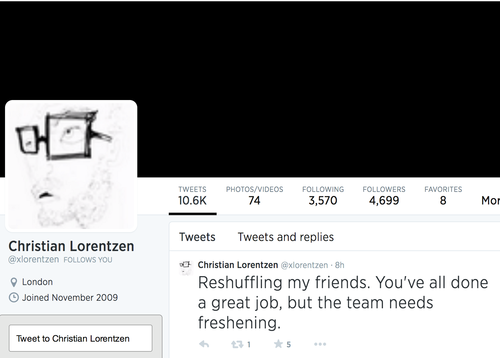
Welcome back to What Would Twitter Do? where I speak to some of my favourite people on Twitter about their feelings and thoughts about the medium. In this, our sixth week, I speak to speak to Christian Lorentzen (@xlorentzen) who is a cultural and literary critic, former editor at Harper’s, and current editor at the London Review of Books.
When I first started getting into his tweets, I thought, “Ah! A novelist of twitter!” Though Christian doesn’t, as far as I know, write fiction, his feed seemed like what someone who only expressed himself as a fiction writer within the universe of twitter might come up with. Not to say his tweets sound like fiction—I mean more that I had the feeling of reading a great cult novelist as I read his tweets.
His feed has a surreal, funny, deadpan, mysterious quality—and sometimes an odd soberness. There is a sort of ubiquitous “twitter tone” one ends up being really familiar with, but Christian’s feed never falls into cheap irony or knowingness or self-seriousness or aggressive weirdness. A recent spate of his tweets read:
They’ve fallen out of favour in recent years, but there’s nothing like a really great tree fern.
There’s something in New Zealand they call ‘the vegetable sheep.’
I was inspired to grow vegetables in new parts of the garden: squashes. Some have thrived but some have wilted, withered and died.
And so on for another eleven tweets. While an earlier tweet read simply: Going for a stroll to an antiquated book store.
I never know how to take his tweets, but I always love reading them.
– Sheila Heti
SH: When you tweet, do you have an audience in mind, and who is it?
CL: I imagine my audience on Twitter to be tripartite: 1) people who actually know me independently of Twitter or know of me either through hearsay or else through reading things I’ve published in magazines and newspapers; 2) people who know me only via tweets yet somehow ‘get’ me; 3) people who know me only via tweets and react to them with a mixture of confusion, annoyance and disdain. To the last to groups I might add people who only know me via retweets, and I’d imagine their ‘getting’, bewilderment or disdain to be heightened. I’d like to imagine that there are some who belong alternately to the second and third group, and that these are people who have followed me, then unfollowed me, then followed again, which seems to happen sometimes. But probably there’s a larger group of people who have unfollowed me and thought, ‘Good riddance!’
SH: Sometimes you will (or you used to)...
You have reached your article limit
Sign up for a digital subscription and continue reading all new issues, plus our entire archives, for just $1.50/month.
Already a subscriber? Sign in




